- Home
- Isabel Allende
The Sum of Our Days Page 5
The Sum of Our Days Read online
Page 5
In the section for newborns we were met by Odilia, she of the thousand curls, with Sabrina in her arms. She had already hinted, during an earlier visit, that she wanted to adopt Sabrina. Grace held out her arms and Odilia handed her the baby, who seemed to have lost weight and was shivering even more than before. But she was alert. Her large Egyptian eyes gazed into Grace’s and then focused on Fu. I don’t know what she told them in that first glance, but it was definitive. Without discussion, with a single voice, the two women declared that Sabrina was the little girl they had been waiting for all their lives.
I HAVE BEEN ONE OF THE Sisters of Disorder for several years now, and during that time I have witnessed a number of the marvels they have wrought, but none had such far-reaching effect as Sabrina. Not only did they find two mothers, they sorted out the bureaucratic tangle and facilitated Fu and Grace’s being able to keep the child. By that time the judge had put his signature on the pertinent documents and Rebecca, the social worker, had declared the case closed. When we went to tell her that we’d found another solution, she informed us that Fu and Grace had no license, that they would have to take classes and go through special training to qualify as foster mothers; she added that they were not a traditional couple, and that they lived in another county and “the case” could not be transferred. Although Jennifer had lost custody of her daughter, her opinion still mattered, she added. “I’m sorry, but I don’t have time to spend on something that’s already been decided,” she said. The list of obstacles continued, but I don’t remember the details, only that at the conclusion of the interview, when we were about to leave in defeat, Pauline took Rebecca firmly by one arm.
“You have a very heavy caseload, and you are paid very little. You feel that your work is pointless, because in all the years you’ve been in this position you’ve not been able to save the wretched children who pass through this office,” she said, looking deep into the woman’s soul. “But believe me, Rebecca, you can help Sabrina. This may be your one chance to work a miracle.”
The very next day Rebecca turned the bureaucracy upside down. She recovered all the paperwork and modified what was necessary, and she convinced the judge to sign again, to transfer the pertinent documents to another county, and to certify Fu and Grace as foster mothers . . . all in the blink of an eye. The same woman who the day before had been so indignant about our persistence had been converted into a radiant whirlwind who swept aside every obstacle and with the stroke of her magic pen determined Sabrina’s fate.
“I told you, this child has an ancient and powerful soul,” Odilia commented a couple of weeks later when she handed Sabrina over to her new mothers. “She touches people and they change. She has incredible mental power, and she knows what she wants.”
So in the least expected manner, the monumental battle between Willie and me was resolved. We forgave each other, as much my dramatic accusations as his stubborn silence; we were able to put our arms around each other and weep with joy because that granddaughter had found her nest. Fu and Grace carried away their little mouse with the big wise eyes, and the circle of my friends set in motion the apparatus of their positive intentions to help her live. A photo of Sabrina sat on top of each home altar, and not a day went by that someone did not send up a thought for her. One of our sisters moved to another city, and we invited Grace to replace her in the group—after a period in which we verified that she had a sufficient sense of humor. In the Center of Zen Buddhism at least fifty persons prayed for Sabrina during their meditations and took turns rocking her while the two mothers struggled with her health problems that seemed never to end. During those first months it took five hours to give Sabrina two ounces of milk from an eyedropper. Fu learned to divine the symptoms of each crisis before it surfaced, and Grace, being a physician, had better resources than any of us.
“Are those women gay?” Celia, my daughter-in-law, asked. She had warned me more than once that she could not be beneath the same roof with someone whose sexual preferences did not coincide with hers.
“Of course.”
“But one of them is a nun!”
“A Buddhist nun. She didn’t take a vow of celibacy.”
Celia said nothing more, but she was so impressed with Fu and Grace, whom she came to know very well, that she ended by questioning her own views. She had renounced religion long ago, and had no fear of the devil’s cauldrons, but homosexuality was her strongest taboo. With time, however, she called them and asked forgiveness for the snubs of the past, and often visited them at the Zen Center, taking her children and her guitar to teach her new friends the rudimentary skills of motherhood and to cheer them with Venezuelan songs. Fervent environmentalists, the new mothers had planned to use cotton diapers for Sabrina, but before a month was out they had accepted the disposable ones Celia brought as a gift. They would have had to be demented to go back to the old system of diaper pails and washing by hand. There is no washing machine in the center, everything is organic and difficult. The three became fast friends, and Celia began to show an interest in Buddhism, something that alarmed me because she tended to swing from one extreme to the other.
“It’s a cool religion, Isabel. The only strange thing about those Buddha people is that they eat nothing but vegetables, like burros.”
“I don’t want to see you with your head shaved, or meditating in the lotus position, until you finish raising the children,” I warned her.
Days of Light and Mourning
IN SEPTEMBER CELIA GAVE BIRTH to Nicole as calmly as she had welcomed Andrea sixteen months before. She endured ten hours of labor without a whimper, held by Nico, while I watched, thinking how my son wasn’t any longer the boy I kept treating as if he were mine, but a man who with great composure had assumed the responsibility of a wife and three children. Celia, silent and pale, walked around between contractions, suffering before our helpless gazes. When she felt it was time, she lay on the bed, covered with sweat, trembling, and said something I will never forget: “I wouldn’t trade this moment for anything in the world.” Nico held her as the baby appeared, her head covered with dark fuzz, followed by shoulders and the rest of her body, wet, slippery, and streaked with blood, and once again I experienced the epiphany I had the day Andrea was born and the unforgettable night you left us forever. Birth and death, Paula, are so similar . . . sacred and mysterious moments. The midwife handed me the scissors to cut the thick umbilical cord and Nico placed the baby on her mother’s breast. Nicole was a plump packet of reinforced concrete that avidly latched onto the nipple as Celia talked to her in that unique tongue a mother, hazy from her ordeal and her sudden love, uses with her newborn. We had all been waiting for that child; she was a gift, and with her she brought a breath of redemption and joy. Pure light.
Nicole started screaming the instant she realized that she wasn’t in her mother’s womb any longer, and she never stopped for six months. Her shrieks peeled the paint off the walls and frayed the neighbor’s nerves. Abuela Hilda, that beloved adopted grandmother who had been at my side for more than thirty years, along with Ligia, a Nicaraguan woman who had looked after you and whom I had hired to help with my grandchildren, rocked Nicole night and day, the only thing that quieted her for a few minutes. Ligia had left five children in her country and had come to work in the United States and support them from afar. It had been several years since she’d seen them and she had no hope of rejoining them anytime soon. For months and months those good women installed themselves and the baby in a rocker in my office, as Celia and I worked. I was afraid that from all that cradling and rocking my granddaughter’s brain might be loosened from her skull and leave her impaired. Nicole calmed down the minute they began to give her powdered milk and soup. I think the cause for her despair was pure hunger.
In the meantime, Andrea was compulsively arranging her toys and talking to herself. When she got bored, she picked up her revolting tuto, announced that she was leaving for Venezuela, crawled into a cabinet, and closed the door after her.
We had to bore a hole in that piece of furniture to provide a ray of light and breath of air, since my granddaughter could spend half a day without a word, locked in a space the size of a chicken coop. After Andrea’s operation for strabismus, she had to wear glasses and a black patch that was changed every week from one eye to the other. So she wouldn’t pull the glasses off, Nico dreamed up a contrivance made of six elastic bands and that many safety pins that crisscrossed over the top of her head. Some of the time Andrea tolerated it, but other times she flew into fits of exasperation and yanked the elastic bands until she managed to pull the whole thing down to diaper level. Incidentally, for a short while we had three children in diapers, and that is a lot of diapers. We bought them wholesale, and the most convenient system of changing the three was all at one time, whether they needed it or not. Celia or Nico would line up the opened-out diapers on the floor, lay the children on them, and wipe bottoms in a row, like an assembly line. They were able to do it with one hand while they talked on the telephone with the other, but I lacked their skill and always ended up plastered to my ears. The children were fed and bathed using the same one-two-three method. Nico got into the shower with them, soaped them, washed their hair, rinsed them off, and handed them out one by one for Celia to towel dry.
“You are a very good mother, Nico,” I told him one day with sincere admiration.
“No, Mamá, I’m a good father,” he replied, but I had never seen a father like him, and to this day I can’t explain how he learned those skills.
At that time I was putting the final touches on my book Paula, struggling over the last pages, which were very painful for me. The memoir ended with your death, there was no other way it could end, but I was hazy on the details of that long night, it was swathed in a dense fog. I thought the room had been filled with people, and that I remembered seeing Ernesto in his Aikido whites, my parents, Granny, the grandmother who loved you so much, dead in Chile many years before, and others who could not possibly have been there.
“You were very tired, Mamá, and very sad. You can’t remember the details,” Nico excused me. “I don’t remember them myself.”
“What do those details matter? Write with your heart,” Willie added. “You saw what we couldn’t see. Maybe it’s true that the room was filled with spirits.”
I often opened the clay urn in which they had handed us your ashes. It is always on my writing table, the same table where my grandmother conducted her spiritist sessions. Sometimes I took out some letters and photographs of you before your illness, but I left those from your last year, when you were tied to your wheelchair, inert. I have never touched those again, Paula. Still today, so many years later, I can’t look at you in that state. I read the letters, especially that spiritual will with instructions to be followed in case of your death, which you had written on your honeymoon. You were only twenty-seven years old at the time. Why were you already thinking of death? I wrote that memoir with many, many tears.
“What’s the matter?” Andrea asked sympathetically in her quasi-language, scrutinizing me with her cyclopean eye.
“Nothing, I just miss Paula.”
“And why is Nicole crying?” she persisted.
“Oh, because she doesn’t know any better,” was the only answer I could think of.
Just as Alejandro had done before her, Andrea got it into her head that Paula was the only valid reason for crying. Since she could use only one eye at a time, she had no depth perception, everything was flat, and she gave herself some fearful bumps and bangs. She would get up off the floor streaming blood from her nose, with her eyeglasses all askew, and explain between sobs that she “missed” her Aunt Paula.
WHEN I FINISHED WRITING Paula, I realized that I had traveled a tortuous road and reached the end cleansed and naked. Those pages contained your luminous life and the trajectory of our family. The terrible confusion of that year of torment had dissipated. It had become clear that my loss was not exceptional but that of millions of mothers: the most ancient and most common suffering of humankind. I sent off the manuscript to people I’d mentioned in it; I felt that they should have the right to revise what I’d written about them. There weren’t many because I’d left out several people who were close to you but that weren’t essential to the main story. After they’d read it, everyone wrote me immediately, moved and enthusiastic, except for my best friend in Venezuela, Ildemaro, who adored you and thought that you would not enjoy seeing yourself exposed in that way. I’d had that same doubt, because it is one thing to write as catharsis, to honor a daughter you have lost, but quite a different thing to share your grief publicly. “You may be called an exhibitionist, or accused of using your tragedy to make money, you know how unkind people can be,” my mother warned me; she was worried although she was convinced that the book should be published. To avoid any suspicion of the kind, I decided I would not touch a penny of the income from the book, if there was any; I would find an altruistic use for it, something that you would have approved of.
Ernesto was living in New Jersey, where he was working in the same multinational company that had employed him in Spain. When we brought you to our home, he asked for a transfer in order to be near you, but there was no position available in California and he had to accept the one he was offered in New Jersey—at least it was closer than Madrid. When he received the manuscript of the book, he called me, crying. It had been a full year since he’d been widowed but he still couldn’t mention your name without breaking up. He encouraged me, using the charitable argument that you would like for the memoir to be published since it could console others who had losses and sorrow, but he added that he nearly hadn’t recognized you in those pages. I had narrated the story from my narrow point of view. As your mother, there were areas of your personality and life that I knew nothing about. Where was Paula the impulsive lover, the finicky and bossy wife, the unconditional friend, the caustic critic? “I’m going to do something that Paula would kill me for if she knew,” he told me, and three days later the mail brought me a large box containing the passionate love letters you two had exchanged for more than a year before you were married. It was an extraordinary gift that allowed me to know you better. With Ernesto’s permission, I was able to include in the book actual lines you had written.
While I was polishing the final version of the book, Celia took complete charge of the office, wearing her blouse half buttoned so she could nurse Nicole at any minute. I don’t know how she did it; she had three children, she was worn out, and she was carrying a profound sorrow. Her grandmother had died in Venezuela and she hadn’t been able to tell her good-bye because her visa would not allow her to leave and then reenter the country. That grandmother, who treated everyone brusquely—except for Celia—had looked after her for three years when her parents were in the United States to work on doctorates in geology. When they returned, Celia didn’t know who those people were that she suddenly had to call Mamá and Papá. The pole star of her childhood had been her grandmother; she’d always slept with her, she told her her secrets, and only with her did she feel safe. A brother and sister were born after their return. Celia continued to be very close to her grandmother, who lived in an addition her parents built to their house. Celia’s childhood in a strictly Catholic family could not have been easy given her rebellious and defiant character, but she submitted, and as an adolescent she had lived in an Opus Dei residence where the penances included self-flagellation and hair shirts with metal barbs. Celia says she didn’t go to those extremes but she had to accept other rules meant to subdue the flesh: blind obedience, avoiding any contact with the opposite sex, fasting, sleeping on a board, spending hours on her knees, and other mortifications that were more frequent and more severe for women, since it is they who since the time of Eve have embodied sin and temptation.
Among the thousands of available young men in the university, Celia fell in love with Nico, who was precisely the opposite of what her parents had wanted in a son-in-law: he was Chilean, an
immigrant, and an agnostic. Nico had been educated in a Jesuit school, but the day after he took his first communion he announced he did not plan to set foot in a church again. I met with the principal to explain that I would have to withdraw my son from the school, but the priest burst out laughing. “That won’t be necessary, señora, we don’t force anyone to go to mass. Your little guy is only nine years old, after all, and he may change his mind, don’t you agree?” I had to admit that I didn’t think so, because I know my son very well: he isn’t one to make hasty resolutions. Nico completed his education at San Ignacio and fulfilled his word never to enter a church—with a few exceptions such as his religious wedding to Celia, and a few cathedrals he has visited as a tourist.
Celia had not been able to be with her grandmother as she died or weep at her death, for the truth is, Paula, you left no room for other mourning. Nico and I hadn’t realized the magnitude of Celia’s grief, partly because we didn’t know the whole story of that period of her childhood and partly because Celia, taking pride in her fortitude, hid her pain. She buried that memory to cry over later, in the meantime performing the thousand tasks of maternity and matrimony, her job, learning English, and surviving in the new land she had chosen. During the few years we had shared, I had learned to love Celia, despite our differences, and after you were gone I clung to her as if she were another daughter. I was worried about the way she looked; her color was bad and she had no appetite, and she was suffering attacks of nausea as bad as the ones in the worst months of her pregnancy. Cheri Forrester, the family physician who had attended you, though you can’t know that, said that Celia was physically worn down from having the three children in such close succession but that there was no physical cause for her vomiting, and that surely it was emotional; perhaps she was afraid that the porphyria would be repeated in one of their children. “If she doesn’t improve, I’ll have to keep her for a while in a clinic,” she warned us. Celia kept quietly vomiting behind our backs.

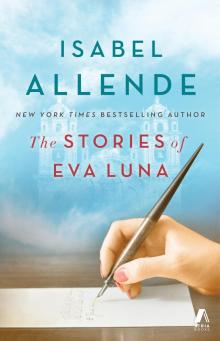 The Stories of Eva Luna
The Stories of Eva Luna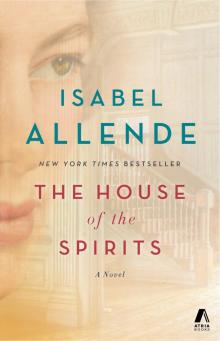 The House of the Spirits
The House of the Spirits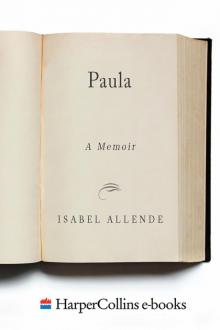 Paula
Paula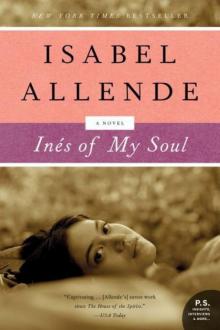 Ines of My Soul
Ines of My Soul Of Love and Shadows
Of Love and Shadows Kingdom of the Golden Dragon
Kingdom of the Golden Dragon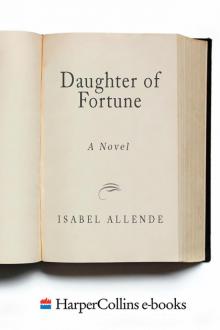 Daughter of Fortune
Daughter of Fortune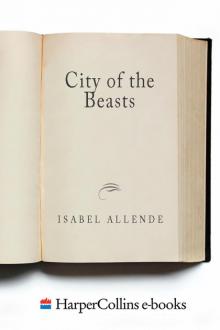 City of the Beasts
City of the Beasts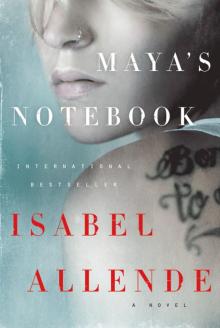 Maya's Notebook
Maya's Notebook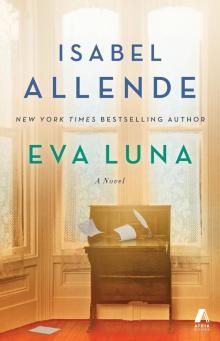 Eva Luna
Eva Luna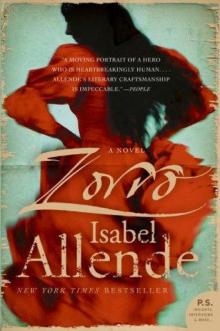 Zorro
Zorro In the Midst of Winter
In the Midst of Winter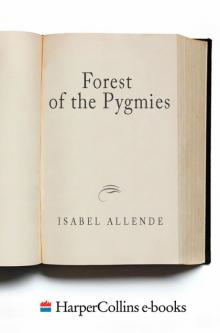 Forest of the Pygmies
Forest of the Pygmies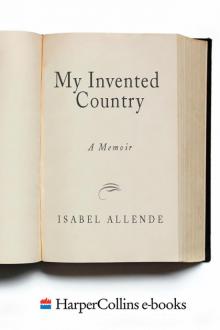 My Invented Country: A Nostalgic Journey Through Chile
My Invented Country: A Nostalgic Journey Through Chile The Japanese Lover
The Japanese Lover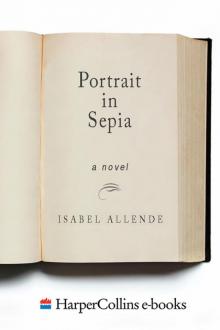 Portrait in Sepia
Portrait in Sepia Island Beneath the Sea
Island Beneath the Sea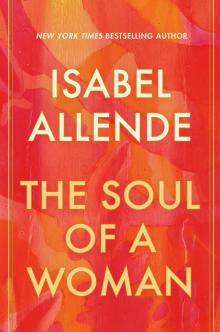 The Soul of a Woman
The Soul of a Woman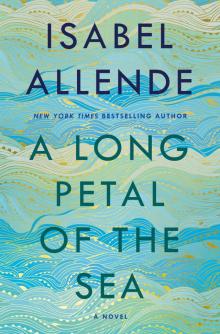 A Long Petal of the Sea
A Long Petal of the Sea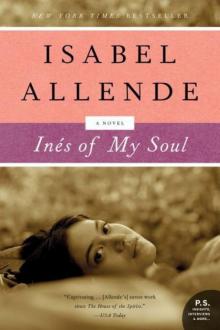 Ines of My Soul: A Novel
Ines of My Soul: A Novel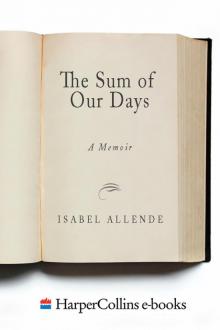 The Sum of Our Days
The Sum of Our Days